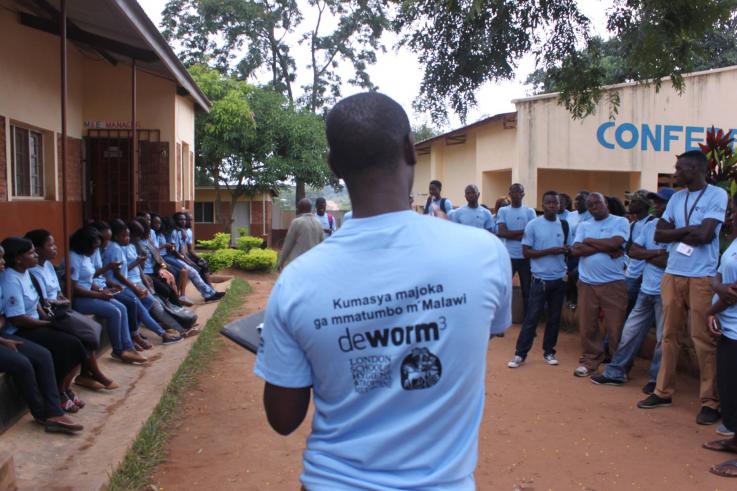
Neglected Tropical Diseases (NTDs) are a group of 20 conditions, such as dengue, leprosy, and intestinal worms. NTDs affect over 1 billion people globally, and are associated with devastating health, social, and economic outcomes including permanent disability and impoverishment. The World Health Organization (WHO) aims to mobilize political will, community commitment, resources, and action needed to end unnecessary suffering from NTDs and shed light on the strides made in combating NTDs. As such, several NTDs are targeted for control for elimination by 2030.
Global WACh, a center within the Department of Global Health, is a leader on NTD research. On World Neglected Tropical Diseases Day, January 30, we take a look at the work they are doing on parasitic worms known as soil transmitted helminths (STH).
The World Health Organization estimates that STH affects 1.5 billion people or 24% of the world’s population. STH is particularly dangerous for pre-school and school-age children and is associated with adverse outcome such as growth stunting, cognitive delay, and chronic anemia amongst children who are heavily infected with worms. The DeWorm3 Study is a large cluster randomized clinical trial that aims to determine the feasibility of interrupting the transmission of parasitic worms, known as Soil Transmitted Helminths (STH). They aim to do so through community-wide mass drug administration (cMDA) that provides deworming medication to individuals of all ages in selected communities in Benin, Malawi, and India. Clusters were either assigned to receive cMDA where treatment was delivered door-to-door to expand testing and treating people of all ages, or to receive the country’s current standard of care treatment which delivers deworming medication to pre-school and school-age children.
“There is nothing more urgent than the need to stand with our global partners in the fight against neglected tropical diseases,” said Dr. Judd Walson, DeWorm3 Principal Investigator and Chair of the Department of International at Johns Hopkins University (formerly vice chair of the Department of Global Health at the University of Washington), “These are diseases that affect the most vulnerable populations globally and the opportunity to support our colleagues as they address these challenging conditions is a testament to the important role that we can play as a partner in these efforts.”
Accomplishments
The study began in 2016 with results expected in spring of 2024. Over the course of the study, DeWorm3 successfully delivered six rounds of community-wide MDA, distributing over 890,000 doses of albendazole preventative chemotherapy via a mass drug administration platform across the three countries. In order to assess changing disease prevalence and intensity of infection over time, the DeWorm3 study collected and tested over 120,000 stool samples for selected STH. In addition to the main aims of the study, the DeWorm3 team has analyzed the costs of delivering cMDA vs school-based deworming as well as structural readiness to transition to and scale-up cMDA programs in the three countries. Additionally, the Implementation Science team conducted a qualitative study with policy stakeholders at local, state, national and global level gauge their thoughts regarding interrupting STH transmission and determined barriers and facilitators to implementation (Roll 2022).
Overall, DeWorm3 has published over 50 papers to date on diagnostics, geographical distribution, implementation science, modeling, pharmacology, treatment strategy and STH surveillance.
Next Steps
In the next six months, the team will disseminate final findings from the study to communities living in study sites, Ministries of Health, and the broader STH Stakeholders, including the World Health Organization.
Contribution to the WHO Sustainable Development Goal
DeWorm3 is a testament to the importance of strong community engagement and global research collaboration. DeWorm3 findings will continue to advance the WHO Sustainable Development Goal 3.3 and WHO milestones and targets outlined in the Ending the neglect to attain the Sustainable Development Goals: a road map for neglected tropical diseases 2021−2030. This World NTD Day, let us celebrate the achievements made in the ongoing battle against NTDs and renew our commitment to creating a healthier, more equitable world for all.
By: Koumudi Thanda, on behalf of DeWorm3 Team